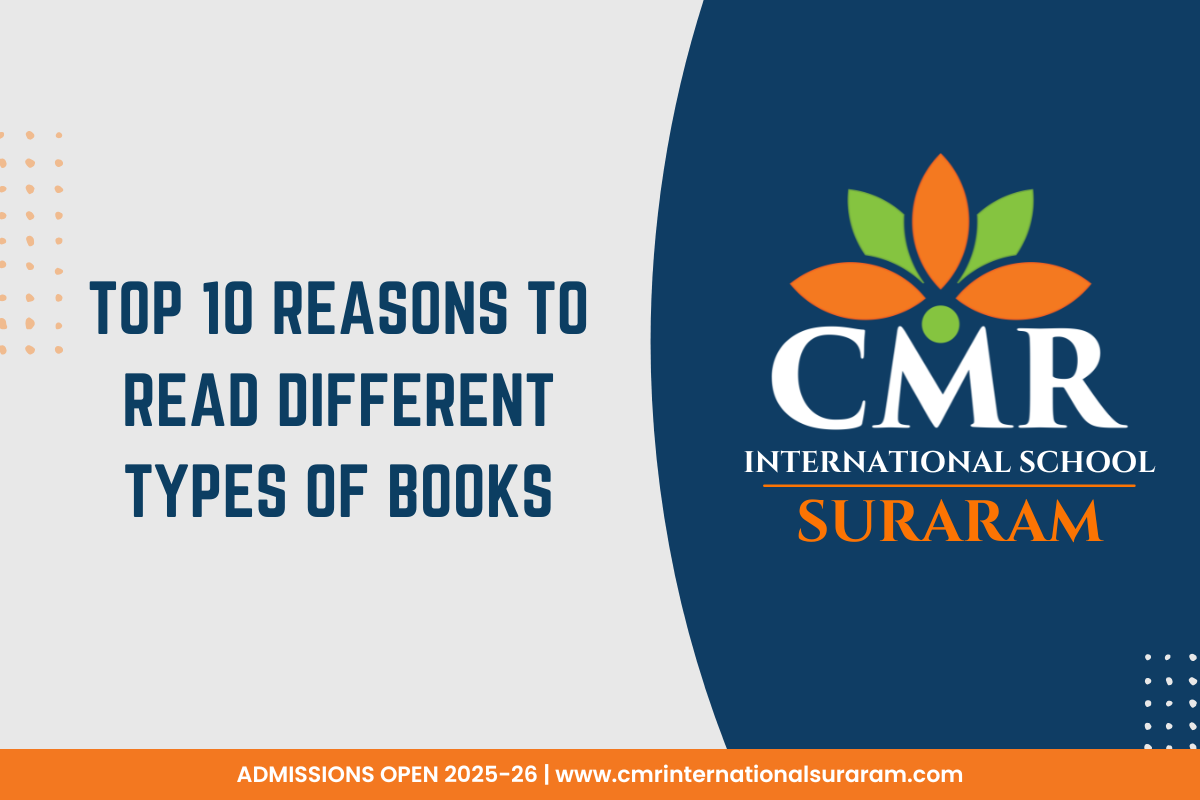Introduction
Have you ever wondered why some people love novels, while others dive into biographies, science books, or poetry? At CMRIS, we believe that reading is not just a hobby—it’s a lifelong habit that shapes minds and nurtures creativity. Reading different types of books is like tasting different cuisines. Each book type offers unique flavors, lessons, and experiences that make life richer and more meaningful.
In this article, we explore the Top 10 reasons to read different types of books and why it’s one of the best gifts you can give yourself.
1. Expands Knowledge Beyond One Field
Reading different types of books—be it history, science, literature, or travel writing—broadens your perspective. Instead of being limited to one subject, you gain insights from multiple fields, making you more informed and well-rounded.
2. Boosts Imagination and Creativity
Fiction takes you to magical lands, while fantasy books introduce you to worlds you never imagined. By exploring different genres, your creativity expands, helping you think outside the box in everyday life.
3. Improves Vocabulary and Language Skills
Whether it’s poetry, classics, or modern novels, books expose you to new words and sentence structures. This not only improves communication but also enhances writing and speaking skills.
4. Strengthens Critical Thinking
Mystery novels, biographies, and non-fiction books challenge your mind to analyze situations, compare viewpoints, and form your own opinions. This sharpens problem-solving skills, useful in both academics and life.
5. Encourages Empathy and Emotional Intelligence
Reading stories about diverse characters allows you to step into their shoes, experiencing their struggles, joys, and emotions. This develops empathy and helps you understand people better.
6. Offers Stress Relief and Relaxation
A good novel can be like a vacation for the mind. Just 20–30 minutes of reading daily can lower stress levels, calm the mind, and promote mental well-being.
7. Builds Cultural Awareness
Books about different cultures, traditions, and histories help you appreciate diversity. They open windows to the world, making you more tolerant and globally aware.
8. Prepares for Real-Life Challenges
Self-help, motivational, and autobiographical books provide lessons from real experiences. They inspire resilience, problem-solving, and confidence to face challenges.
9. Improves Focus and Concentration
In an age of constant distractions, reading trains the mind to concentrate for longer periods. Unlike scrolling on social media, books require attention and patience, strengthening focus.
10. Shapes Lifelong Learning Habits
Reading different books develops a habit of continuous learning. Once you start exploring varied genres, curiosity becomes a part of you, leading to personal and intellectual growth.
Conclusion
Books are not just pages with words—they’re windows to countless worlds. By reading different types of books, you become more knowledgeable, empathetic, creative, and prepared for life. At CMRIS, we encourage students and families to make reading a daily practice, because each book you read leaves you wiser than before.
FAQs
1. Why is it important to read different types of books?
Reading varied books gives you a broader perspective, sharpens skills, and makes learning more enjoyable.
2. How does reading fiction help in real life?
Fiction boosts creativity, empathy, and problem-solving, all of which are valuable in real-world situations.
3. Can reading reduce stress?
Yes! Studies show that reading daily can reduce stress, calm the mind, and improve mental health.
4. Which books are best for improving language skills?
Classics, poetry, and well-written novels are excellent for vocabulary and language development.
5. How can schools encourage students to read more?
Schools can organize book clubs, storytelling sessions, and library hours to make reading a fun and shared activity.

